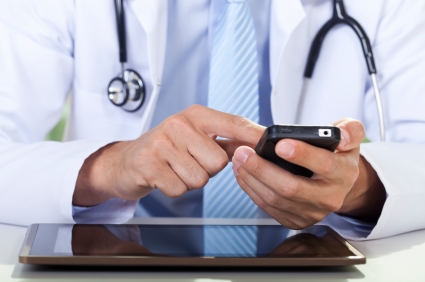
More than 6 billion people worldwide (including almost 400 million in the United States) now carry mobile phones, which could be used to enhance mental and physical health, a Cornell researcher proposed.
Phones can give owners important information about their environment, offer advice and reminders to encourage healthy behavior and supply mountains of data to researchers, said Deborah Estrin, professor of computer science at Cornell NYC Tech in New York City.
Estrin outlined her vision for “mobile health” in the presentation “Transforming Health Care Through Mobile Platforms,” part of the symposium Smart Phones, Smart Devices, Social Networks, and Smart Health Care, at the 2013 Annual Meeting of the American Association for the Advancement of Science in Boston. The symposium, chaired by Google vice president Vinton Cerf, explored how emerging “net-centric societies” will transform the health care landscape.
“We can leverage the power and ubiquity of mobile and cloud technologies to assist individuals, clinicians and researchers in monitoring and managing symptoms, side effects and treatment outside the clinical setting; and to address the lifestyle factors that can bring on or exacerbate health conditions,” Estrin said.
Health-enhancing applications of mobile devices might include diet and exercise tracking, medication reminders, monitoring of social and environmental stress and the formation of online support groups. As examples, Estrin cites PTSD Coach, developed by the Department of Defense and the Veteran’s Administration to help veterans cope with post-traumatic stress disorder symptoms; mobile reporting from a diabetic’s glucose meter; and the Fitbit wireless activity tracker.
While there are many applications for dedicated devices, Estrin said she is particularly interested in converting phone apps into data streams. “An app like PTSD Coach is used by a participant as a source of assistance, but the data analytics that the app generates- when and where they use it, how frequently, to what effect (they rate their symptoms going in and out of each tool)- is a rich source of info for their clinician,” she said.
GPS tracking, she added, can show how much a person is moving around, and that can be a “behavioral biomarker” for arthritis pain. For privacy, apps would show the clinician a summary of movement, not reporting specifically where the patient went.
Estrin advocates “scaling down” to make apps that are useful to individual patients. Useful apps will proliferate, allowing researchers to collect data from large populations and learn what works.
Mobile phones also could be used by citizens to document pollution sources and other environmental hazards with their GPS coordinates, enabling municipalities to map trouble areas. Individuals could in turn access such maps and other databases, for example to choose a jogging route with the least air pollution.
To make all this happen, Estrin said, computer scientists should develop new techniques to analyze the “digital exhaust” from the use of mobile apps and devices, along with standards and privacy mechanisms.
Estrin was the founding director of the Center for Embedded Networked Sensing at the University of California-Los Angeles, which explores the use of distributed sensors and actuators- the so-called “Internet of things”- to collect information about the physical world, and is co-founder of the nonprofit Open mHealth, devoted to using mobile devices to enhance mental health. Open mHealth is developing Ohmage, a suite of open-source software tools for use in building mobile health apps.
The first faculty member of the new Cornell Tech campus, with a joint appointment as professor of public health at Weill Cornell Medical College, Estrin was named as one of the Brilliant 10 in Popular Science magazine, one of Wired Magazine’s 2012 50 People Who Will Change the World and one of CNN’s 10 Most Powerful Women in Tech.
Source: Cornell University
Thanks for installing the Bottom of every post plugin by Corey Salzano. Contact me if you need custom WordPress plugins or website design.

